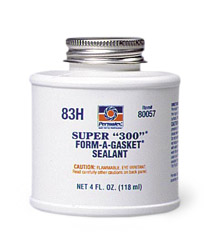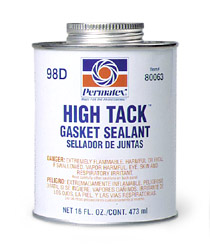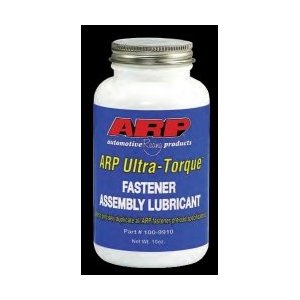many guys have coolant leaks from studs and head bolts,you don,t need that P.I.T.A.
guys! Ive YET to have a single stud or bolt leak!
its simple! run a tap thru the threads, test screw the clean/dry stud by hand to verify no clearance or binding then ,clean them and dry the threads on the block and studs,before you start the assembly, and just dip the total threaded surface on the lower studs course thread end of the stud that screws into the block into the correct sealant. spin it in your fingers slowly as you move the stud to the hole in the block to keep from dripping sealant on the deck,
thread it into the block full depth , back it out a 1/2 turn and let it set up for a few minutes before assembling the head gaskets and heads,but assemble the heads while the sealants still fresh/liquid, torque too spec and let the engine set for a few hours (preferably over night)
http://www.devcon.com/products/products.cfm?familyID=386
either product pictured below works on head bolt or rocker stud threads, simply dip the threads and screw into place


the stuff works far more relieably than most thread pastes or thread sealants, it cleans ,off fingers with a scotchbrite pad and gas or alcohol,....provided you have not let it set up on your skin very long, once its started too dry ...good luck
YES it works on BOLTS ALSO

this should be used only in head bolt holes that don,t enter water jackets in the block
OLD POST COVERS THAT INFO
I can,t believe the stuff I see at times..in the car mags that are SUPPOSED to be articles composed by guys who know what they are doing!!!!!!!
I picked up a copy of one of the more comon, chevy based magazines and theres PICTURES of a guy dipping head bolts in yellow weather strip adhesive to be used as a thread sealant on the bolt threads (its not designed to come in direct contact with oil and/or high heat coolant),and its not going to give the correct tq readings either, and on the next page the guys gooping, GOBS of clear silicone like youll use to seal aquariums or bathroom fixtures 1/4 thick on/around the intake manifold ports, NEITHER SEALANT is DESIGNED FOR or is LIKELY to perform correctly IN EITHER APPLICATION, and WHERE does this guy think all that excess silicone will go once the intakes torqued down????
theres only two high probabilitys, it will flow into the port where it will eventually harden and get sucked into the cylinders or it may hang there causing a restriction in the port, or if it flows down, it gets into the lifter gallery where its eventually going to get into the oil pump pick up screen, restricting or blocking oil flow
i would not let these guys fix a flat tire let alone work on MY ENGINES all I can do is shake my head and wonder who if ANYONE screens these articles
always use the manufacturers suggested installation instructions, as some applications or gasket types REQUIRE differant lubes or sealants but heres a rought guide
head bolts #5, dip clean dry thread in
http://www.devcon.com/devconfamilyproduct.cfm?familyid=386&catid=69
or this
http://www.devcon.com/products/products.cfm?brandid=2&familyid=384
(NOT QUITE AS GOOD BUT STILL OK)
then insert and tq heads in place
head gaskets #3
main bolts #2
rod bolts #2
oil pump stud and nut #4
oil pan bolts #5
oil pan gasket #6
cam spocket bolts #4
timing cover gasket #6
timing cover bolts #1
intake bolts #1
intake gasket #6
thermostat housing bolts #5
thermostat housing gasket (also do you really need it) usually yes #6
Exhaust manifold/header bolts #1
Exhaust manifold/header gaskets #3
Water pump bolts #5
water pump gaskets #6
fuel pump #6
crank/damper bolt #1
Torque converter bolts #4
flywheel/flexplate bolts #4
bellhousing bolts #2
1 antiseize
2 oil or ARP thread lube
3 copper coat spray gasket sealer or apply dry in some cases (see manufactures suggestions)
4 loctite (red or blue depends on application ,read the lables)
5 http://www.devcon.com/devconfamilyproduct.cfm?familyid=386&catid=69
6 black high temp RTV
use the correct stuff for the application, AND READ & FOLLOW THE DIRRECTIONS it prevents PROBLEMS
studs put less stress & wear on the block deck threads, and provide more consistant clamp loads, the 12 point, stud nuts and washers tend to have less clearance issues in tight areas, than the head on a 6 point bolt, and are less likely to round off as the tq is applied, but be aware that getting the heads up and out in a confined engine compartment is generally a P.I.T.A. over studs that extend up several inches past the block when fenders and brake boosters, etc. are in the way
http://www.northernautoparts.com/Pro...tModelId=14706
http://www.northernautoparts.com/Pro...tModelId=14714
bits of useful info here
http://forums.hybridz.org/showthread...hlight=sealant
Originally Posted by zthis
thanks grump can you tell me anything about "Undercut" studs are they worth the extra $$$
that depends on the application thier used in, the under cut studs maintain thier clamp force, more consistantly over a longer stretch distance, let me explain that a bit
if you use the standard , studs on a cylinder head the heads get torqued in place at standard temps, when the engine heats up the metals expand, and the clamp loads tend to increase a bit,when it cools the metals contract,and the clamp loads tend to return to original levels, this cycles the stress and clamp loads, on an iron block with iron heads and even with aluminum heads the standard non-under cut studs are fine in most applications,because BOTH the studs and the head gaskets are designed to work with this repetitive cycle, if you have an all aluminum block and heads your probably better off with the under cut studs due to the greater dimensional shifts as the engine changes temp.
either design will tend to keep the clamp forces in a useable and predictable range, but the non-undercut studs are less likely to maintain the same exact clamp forces over the temp shifts the engine sees between running and cooling cycles.
short answer, on a iron block engine ID just sellect the standard ARP studs and follow the installation info posted earier in the thread, keep in mind aluminum thread strength fatigues far faster than iron or steel and it requires about 2.5-3 times the thread dia. to depth ratio to equal the resistance to stripping threads in aluminum vs about 1.7-2 times the thread dia. to depth ratio to equal the resistance to stripping threads in steel or iron
guys! Ive YET to have a single stud or bolt leak!
its simple! run a tap thru the threads, test screw the clean/dry stud by hand to verify no clearance or binding then ,clean them and dry the threads on the block and studs,before you start the assembly, and just dip the total threaded surface on the lower studs course thread end of the stud that screws into the block into the correct sealant. spin it in your fingers slowly as you move the stud to the hole in the block to keep from dripping sealant on the deck,
thread it into the block full depth , back it out a 1/2 turn and let it set up for a few minutes before assembling the head gaskets and heads,but assemble the heads while the sealants still fresh/liquid, torque too spec and let the engine set for a few hours (preferably over night)
http://www.devcon.com/products/products.cfm?familyID=386
either product pictured below works on head bolt or rocker stud threads, simply dip the threads and screw into place


the stuff works far more relieably than most thread pastes or thread sealants, it cleans ,off fingers with a scotchbrite pad and gas or alcohol,....provided you have not let it set up on your skin very long, once its started too dry ...good luck
YES it works on BOLTS ALSO

this should be used only in head bolt holes that don,t enter water jackets in the block
OLD POST COVERS THAT INFO
I can,t believe the stuff I see at times..in the car mags that are SUPPOSED to be articles composed by guys who know what they are doing!!!!!!!
I picked up a copy of one of the more comon, chevy based magazines and theres PICTURES of a guy dipping head bolts in yellow weather strip adhesive to be used as a thread sealant on the bolt threads (its not designed to come in direct contact with oil and/or high heat coolant),and its not going to give the correct tq readings either, and on the next page the guys gooping, GOBS of clear silicone like youll use to seal aquariums or bathroom fixtures 1/4 thick on/around the intake manifold ports, NEITHER SEALANT is DESIGNED FOR or is LIKELY to perform correctly IN EITHER APPLICATION, and WHERE does this guy think all that excess silicone will go once the intakes torqued down????
theres only two high probabilitys, it will flow into the port where it will eventually harden and get sucked into the cylinders or it may hang there causing a restriction in the port, or if it flows down, it gets into the lifter gallery where its eventually going to get into the oil pump pick up screen, restricting or blocking oil flow
i would not let these guys fix a flat tire let alone work on MY ENGINES all I can do is shake my head and wonder who if ANYONE screens these articles
always use the manufacturers suggested installation instructions, as some applications or gasket types REQUIRE differant lubes or sealants but heres a rought guide
head bolts #5, dip clean dry thread in
http://www.devcon.com/devconfamilyproduct.cfm?familyid=386&catid=69
or this
http://www.devcon.com/products/products.cfm?brandid=2&familyid=384
(NOT QUITE AS GOOD BUT STILL OK)
then insert and tq heads in place
head gaskets #3
main bolts #2
rod bolts #2
oil pump stud and nut #4
oil pan bolts #5
oil pan gasket #6
cam spocket bolts #4
timing cover gasket #6
timing cover bolts #1
intake bolts #1
intake gasket #6
thermostat housing bolts #5
thermostat housing gasket (also do you really need it) usually yes #6
Exhaust manifold/header bolts #1
Exhaust manifold/header gaskets #3
Water pump bolts #5
water pump gaskets #6
fuel pump #6
crank/damper bolt #1
Torque converter bolts #4
flywheel/flexplate bolts #4
bellhousing bolts #2
1 antiseize
2 oil or ARP thread lube
3 copper coat spray gasket sealer or apply dry in some cases (see manufactures suggestions)
4 loctite (red or blue depends on application ,read the lables)
5 http://www.devcon.com/devconfamilyproduct.cfm?familyid=386&catid=69
6 black high temp RTV
use the correct stuff for the application, AND READ & FOLLOW THE DIRRECTIONS it prevents PROBLEMS
studs put less stress & wear on the block deck threads, and provide more consistant clamp loads, the 12 point, stud nuts and washers tend to have less clearance issues in tight areas, than the head on a 6 point bolt, and are less likely to round off as the tq is applied, but be aware that getting the heads up and out in a confined engine compartment is generally a P.I.T.A. over studs that extend up several inches past the block when fenders and brake boosters, etc. are in the way
http://www.northernautoparts.com/Pro...tModelId=14706
http://www.northernautoparts.com/Pro...tModelId=14714
bits of useful info here
http://forums.hybridz.org/showthread...hlight=sealant
Originally Posted by zthis
thanks grump can you tell me anything about "Undercut" studs are they worth the extra $$$
that depends on the application thier used in, the under cut studs maintain thier clamp force, more consistantly over a longer stretch distance, let me explain that a bit
if you use the standard , studs on a cylinder head the heads get torqued in place at standard temps, when the engine heats up the metals expand, and the clamp loads tend to increase a bit,when it cools the metals contract,and the clamp loads tend to return to original levels, this cycles the stress and clamp loads, on an iron block with iron heads and even with aluminum heads the standard non-under cut studs are fine in most applications,because BOTH the studs and the head gaskets are designed to work with this repetitive cycle, if you have an all aluminum block and heads your probably better off with the under cut studs due to the greater dimensional shifts as the engine changes temp.
either design will tend to keep the clamp forces in a useable and predictable range, but the non-undercut studs are less likely to maintain the same exact clamp forces over the temp shifts the engine sees between running and cooling cycles.
short answer, on a iron block engine ID just sellect the standard ARP studs and follow the installation info posted earier in the thread, keep in mind aluminum thread strength fatigues far faster than iron or steel and it requires about 2.5-3 times the thread dia. to depth ratio to equal the resistance to stripping threads in aluminum vs about 1.7-2 times the thread dia. to depth ratio to equal the resistance to stripping threads in steel or iron
Last edited by a moderator:
